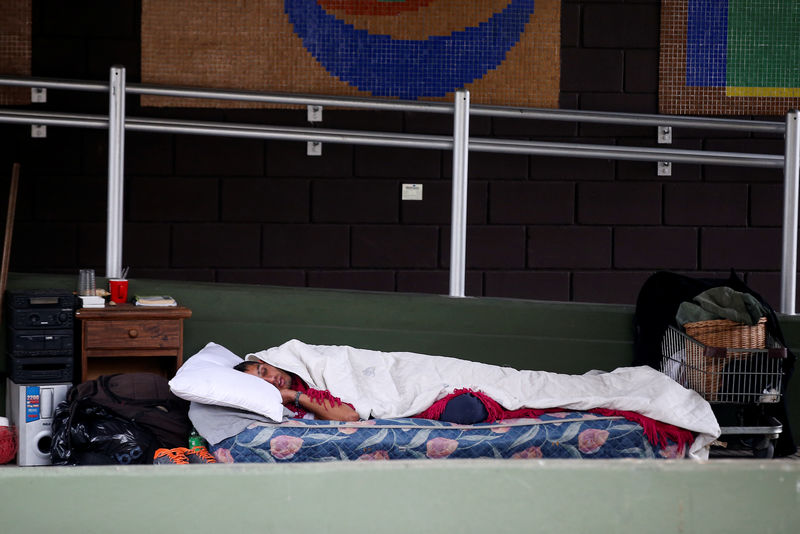By Juan Bustamante
BUENOS AIRES (Reuters) - Silvia Gauna is struggling to make the rent on the one-room Buenos Aires apartment she shares with her teenage daughter. High inflation has driven up rents, with salaries and employment hit by recession. Gauna herself lost her long-term job in August.
Now the 49-year-old risks losing her home, one of a growing number of Argentines straining under rental payments as an economic crisis and popular anger tips South America's No. 2 economy back toward populism ahead of presidential elections this month.
Gauna's plight reflects a broader housing crisis. In the wealthy capital alone, two-fifths of people have difficulty making rent as prices have outstripped salaries, according to the city's independent ombudsman office, double the level in March last year. Homelessness has risen and many houses stand empty.
"I hope the economic situation improves because inflation is killing us, it's emptying our pockets. Either we eat, or we pay our bills, or we pay the rent," Gauna said in her apartment, where the shared bedroom doubles as a dining and living room.
Gauna, who works as a hotel receptionist, lost her long-term position two months ago, just as President Mauricio Macri was dealt an unexpected landslide defeat in primary elections.
The rental crisis underscores broader dynamics in Argentina ahead of elections likely to oust Macri. The center-rightist, a former Buenos Aires mayor, came to power promising to spur investment and eradicate poverty, but now looks set to leave office with millions more in hardship.
Peronist Alberto Fernandez is heavily favored to win the Oct. 27 vote. He is running alongside Cristina Fernandez de Kirchner, who served as Argentina's president from 2007 to 2015 and won strong support among many Argentines with public subsidies to reduce living costs, especially among the poor.
Gervasio Muñoz, president of a local tenants' organization, said Macri's market-oriented reforms and the country's economic crisis had combined to put a squeeze on housing costs and renters.
"With rent increases across the board, people can't cope because of delayed salaries and tough market rules," he said.
"It's been a long time, since I think (the economic crisis of) 2001-2002, that we've seen a situation where so many families in Argentina don't know where they will live because they can no longer pay rent."
'HOW DO I GET OUT?'
Ahead of the vote, Macri has rolled out popular measures to bolster jobs and cut taxes, though many blame his administration's deregulation of the housing market for high rents and for failing to get inflation under control.
Macri has promised his government will look to "take care" of renters worried about an uncertain future. But he has won few favors among hard-hit voters by cutting back on subsidies for public utilities as part of a drive to lower government debts.
Argentina's Congress, meanwhile, is now looking at draft proposals to alleviate the housing crisis. Three proposed housing-related bills went in front of lawmakers on Tuesday.
Fernando Muñoz, an official at the Buenos Aires ombudsman, pointed to the number of people trying to break rental agreements, even as they worry about incurring fines, as a testament to how tough the housing situation has become.
"Many people come and tell us I want to end the contract, I can't keep paying. How do I get out?" he said.
Gauna herself is hoping the country's next leader will help bolster jobs, but is pessimistic with economic growth forecasts deteriorating and annual inflation running at over 50%.
She now scrapes by with temporary work to pay the 9,200 Argentine peso ($159.02) monthly rent for her apartment, but said she has had to cut back to eating just one meal a day.
"I am afraid for the future because I do not know what will happen with my work," she said.

"I hope just to have a home and a stable job, and that the next government looks after the workers because we are not having a good time. A house for me is very important, just to leave something to my daughter."